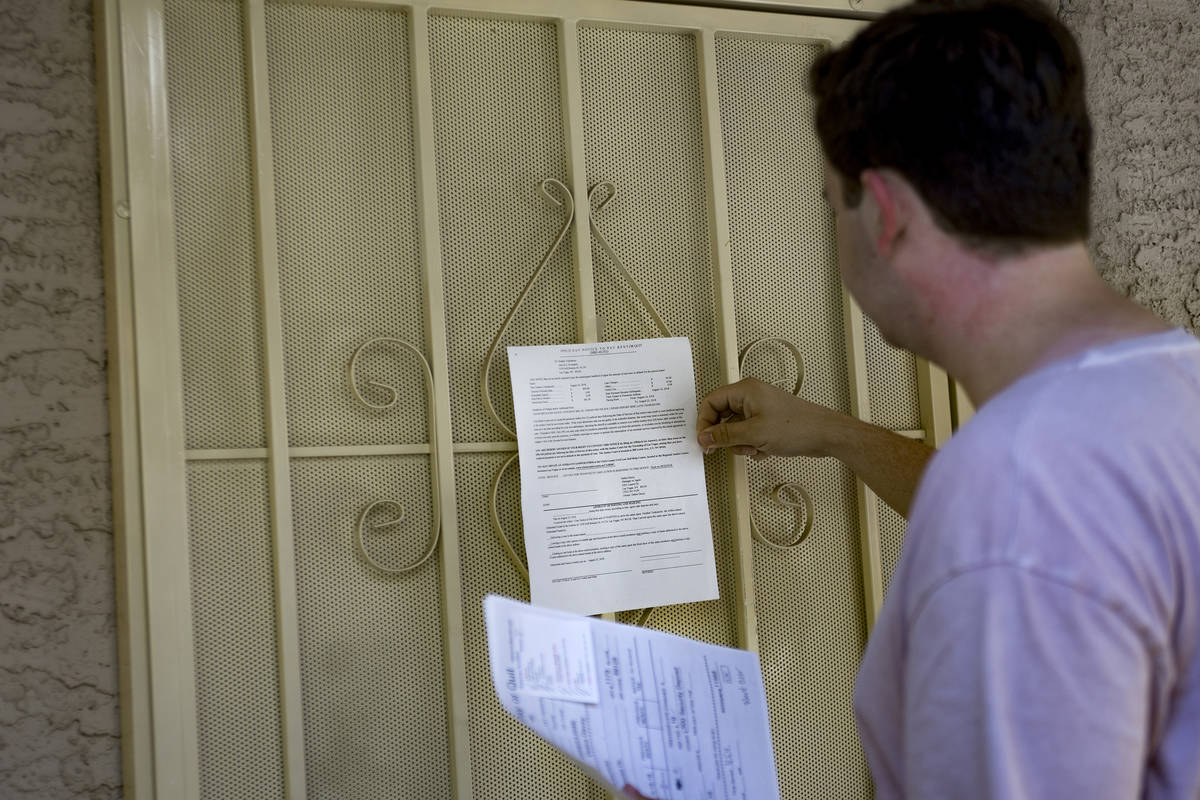Federal eviction moratorium raises questions as state order set to expire
When Gov. Steve Sisolak’s moratorium on residential evictions lifts Thursday, renters will still be protected by a federal eviction moratorium implemented by the Centers for Disease Control and Prevention — in theory.
Confusion is swirling around who is protected and how it will be enforced because moratoriums have prevented nonpayment eviction cases from going to court, where a judge would set an example of what legal experts could expect. And a state law that created a residential eviction mediation program could keep cases out of the court system, possibly further delaying clarity.
“It’s so confusing,” Legal Aid Center of Southern Nevada Attorney Jim Berchtold said. “First there was the CARES Act and then there was (Sisolak’s) moratorium and how did those two interplay with each other, and then the governor kept modifying the moratorium, and then the CDC order came out so tenants naturally are incredibly confused about what’s going on. So, we are doing as much counseling as we can.”
Sisolak’s eviction moratorium prevents landlords from evicting a tenant for nonpayment of rent. It was set to expire Sept. 1 but in a last-minute announcement on Aug. 31 Sisolak extended the moratorium by 45 days.
Less than 24 hours later, the CDC announced it would halt residential evictions nationwide Sept. 4 through the end of this year.
The move gave added protection to renters once Sisolak’s moratorium lifts by keeping Nevada landlords
from serving any kind of eviction notice to a tenant, unless they fall into five types of eviction categories such as engaging in criminal activity while on the premises, damaging property or threatening the health or safety of another resident.
The federal order makes it clear landlords can’t evict tenants for nonpayment of rent, including landlords who have started the eviction process before Sept. 4.
Landlords are subject to steep fines of up to $500,000 and even jail time if they violate the order, but it’s unclear at what point in the process a landlord would be held in violation.
“We don’t know how the court will handle that right now,” Berchtold said. “A landlord runs a huge risk; those penalties in that order is crazy.”
Berchtold said not much guidance has been given and said it could lead to a waste of judicial resources. Should a landlord decide to move forward with the eviction process, a judge could simply say during the eviction hearing that no action can be taken because of the federal moratorium.
“Each case will be independently reviewed and decided by the judge of jurisdiction,” said Brad Lewis, director of the Access to Justice Commission with the Supreme Court of Nevada.
Talk it out
There’s also the possibility a landlord and tenant could be ordered by a judge into the state’s new residential eviction mediation program, meant to help resolve tenant and landlord disputes while easing the number of people in the state’s courthouse.
The mediation program starts Oct. 15 and is only for nonpayment-of-rent evictions — when a tenant receives a seven-day notice to leave or pay rent — though judges can refer other types of eviction cases to mediation if they choose.
A mediator works with the landlord and tenant, at no cost to either party, to resolve their dispute such as working out a payment plan, or even rent relief, so both parties avoid a court-ordered eviction process.
Tenants who receive a seven-day nonpayment notice can request mediation when they file their answer to an eviction notice with the local justice court. However, Berchtold said, if a tenant believes they’re being wrongfully evicted because they’re covered under the CDC order, they should attach a copy of their signed CDC declaration form.
If either party decides not to attend mediation, then the eviction case proceeds.
While the mediation program starts the day Sisolak’s moratorium ends, it’s likely the program will not be used until the end of the year, a result of the federal eviction moratorium.
“If there’s a moratorium, so no evictions are being filed, then yes, the mediation program would be set up, but it wouldn’t necessarily be doing anything,” Berchtold said.
Covered tenant
The CDC issued guidance this past weekend on common questions asked about the temporary order to halt evictions, set to expire Dec. 31.
Tenants eligible to use the CDC order to stave off an eviction must be able to declare:
— That they have used their best efforts to seek out all available government rent or housing assistance.
— That they will have earned no more than $99,000 in annual income for the calendar year 2020 or $198,000 if filing a joint tax return; were not required to report income in 2019 to the IRS; or received a stimulus check as part of the federal coronavirus stimulus bill.
— Are unable to pay their full rent because of a layoff, reduced wages or work hours, substantial loss of household income or “extraordinary out-of-pocket medical expenses.”
— Eviction would force the tenant to be homeless or move into a shared living situation because they have no other available housing options.
If renters believe they are eligible, they must sign a CDC declaration form and give it to their landlord or property manager. Landlords aren’t required to notify their tenant about the CDC order but “must comply with all requirements of the order,” according to CDC guidelines.
The department makes it clear that tenants are still required to pay their monthly rent as it will still accrue along with any fees.
Landlords can also still charge late fees, which in Nevada is no more than 5 percent of a tenant’s monthly rent.

















